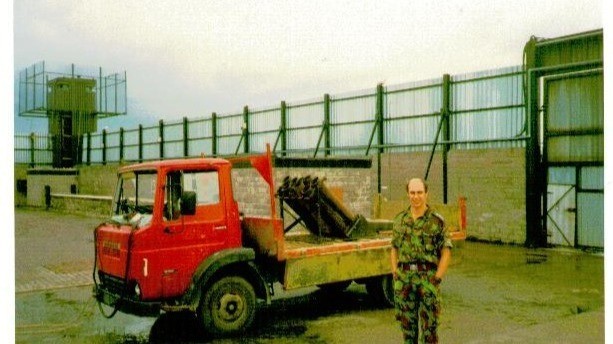Richard Eaton

“A man on a thousand mile walk has to forget his goal and say to himself every morning, ‘Today I’m going to cover twenty-five miles and then rest up and sleep’.”
– Leo Tolstoy
Most of us have had more than one career in our lives, and we naturally carry those learnings forward to subsequent phases of our life journey. Unsurprisingly, we use some of these things more often than others. For example, one of my first jobs was as a grill cook at a local restaurant, and I use these skills practically every week when making dinner at home. Other skills, though equally important additions to our personal tool boxes, are seldom used.
And for good reason.
However, I find it fortuitous that, during these times of global crisis and transformational change, I find myself in the interesting position of being able to draw on some skills from a past career that I’ve seldom used since then.
Pressure Makes Diamonds
For several years I served as an Officer in the British Army’s Parachute Regiment, a famously tough Infantry unit, widely considered second only to many Special Forces organizations. During my service, I found myself deploying, more than once, with my battalion to counter terrorist bombings and killings during ‘The Troubles’ in Northern Ireland: a conflict that killed thousands.
To say that we were not welcomed with open arms would be an understatement. Almost everyone and, seemingly, everything was trying to kill or injure us in one way or another by either gunfire, flame, booby trap or bomb blast.
Quartered in heavily armoured patrol bases, and some that weren’t that heavily armoured come to think of it, we only went outside when armed to the teeth and accompanied by 10, 20, 50 or 100+ other troops to face a vicious and capable terrorist foe from whom we could expect no quarter. Terrorists don’t take prisoners.
The tempo was equally relentless. Patrol followed patrol in a seemingly endless, non-stop, 24/7 progression for months, without respite, punctuated by brief periods of action, and the odd snatch of rest. As you can imagine, this is an incredibly stressful way to live. So what did we learn, and do, to cope? I’m not sure what my colleagues called it but, personally, I adopted a policy I called ‘hard routine’.
Hard Routine
What is hard routine?
During continuous operations in close contact with a wily and unforgiving foe, anything you do that can tip him off will give him the edge in a one-on-one shootout. More often than not, especially during longer term covert observation and ambush operations, you can give yourself away to an alert enemy by messing up on the most basic activities like eating, sleeping, and posting sentries.
These, and a thousand other small tasks, if done wrong, can reveal your intentions to the enemy by sound, smell, visible signs and other clues. Hard routine takes care of many of these variables through various iron clad rules such as ‘eat your food cold’, ‘never take your boots off’ and, ‘keep 5 yards between each man’.
So, here are some things I learned about hard routine that might help in the current situation:
Keep Going
Winston Churchill said “When you are going through hell, keep going.”
I, and the other soldiers and security forces members I worked with realized that, although seemingly endless, one day we would be able to stop what we were doing and begin to live a more normal life. My mental focus was, therefore, on that light at the end of the tunnel. And the only way to get to the end of a tunnel is to keep going.
Don’t Look Too Far Ahead
The big mistake is to look too far ahead.
When your day is filled with a thousand micro-tasks, any of which can get you or others killed if you mess up, your focus must be short term. If you look too far into the future, you can take your eye off the ball with obvious consequences. Consequently, divide your experience into bite sized chunks of, at most, a few hours each.
Mentally, or otherwise, assign yourself a short term goal like ‘I must get from here to there and accomplish that task when I get there.’ Feel good about accomplishing each of these smaller tasks, to give you confidence for the next one. Just like climbing a big mountain at high altitude, every step forward is a small victory. Celebrate it, and keep going.
Keep Your Butt in the Shoulder
Before launching myself from the armoured safety of our security forces base and into the unknown of ‘Bandit Country’, I would always put the butt of my rifle in my shoulder and look down the barrel through the sights. Always. Call it a centering or meditative practice, or a practical shooting tip, or an obsessive-compulsive disorder, I would do this every time and have, therefore, done it hundreds of times.
In retrospect, I believe this simple practice gave me the confidence that, should I walk into a sudden fusillade of machine gun fire, I would not hesitate to return fire if for no other reason than muscle memory. More recently I recognized this lesson I learned years ago in a book by Admiral William H. McRaven, a Navy SEAL. ‘Make your Bed’ contains a similar message: make a habit of taking care of the little things and the little things, and their associated habits, will take care of you – especially when everything is trying to kill you.
Have a Good Read
An Infantry battalion at war is hardly a place of safety yet, paradoxically, there are a hundred different ways to feel safe, in one way or another, even in the midst of danger.
For example, I always carried a book in my gear. A small paperback book. To me this book represented safety because, if you can sit down and read a book without having to worry about getting shot, then that’s a pretty good thing. In our base location I would find a spot between the blast proof wall and the building to have a good read on my own, absorbed in my task while blissfully ignoring the constant clamour of helicopters and other sundry noises around me. On the ground, in a patrol base, when off duty and tucked into my sleeping bag surrounded by my alert colleagues, I would pull the book out and, once again, have a good read.
Doing something normal in abnormal circumstances like reading a book, brushing your teeth, or even knitting, a pursuit favoured by one of my colleagues, is a great example of hard routine.
Make the Most of Less
During a crisis, if you get it right, you will likely be able to enjoy one of the few times in your life when you don’t have to worry about a lot of things. Epictetus, the famous Greek stoic, said “Wealth consists not in having great possessions, but in having few wants.” Of course, there will be things that must be done that can’t be avoided. But the important things, the really important things, can always be counted on the fingers of one hand.
And, you might not be surprised to hear, those most important things are almost always about connecting meaningfully with other people, in one way or another.

